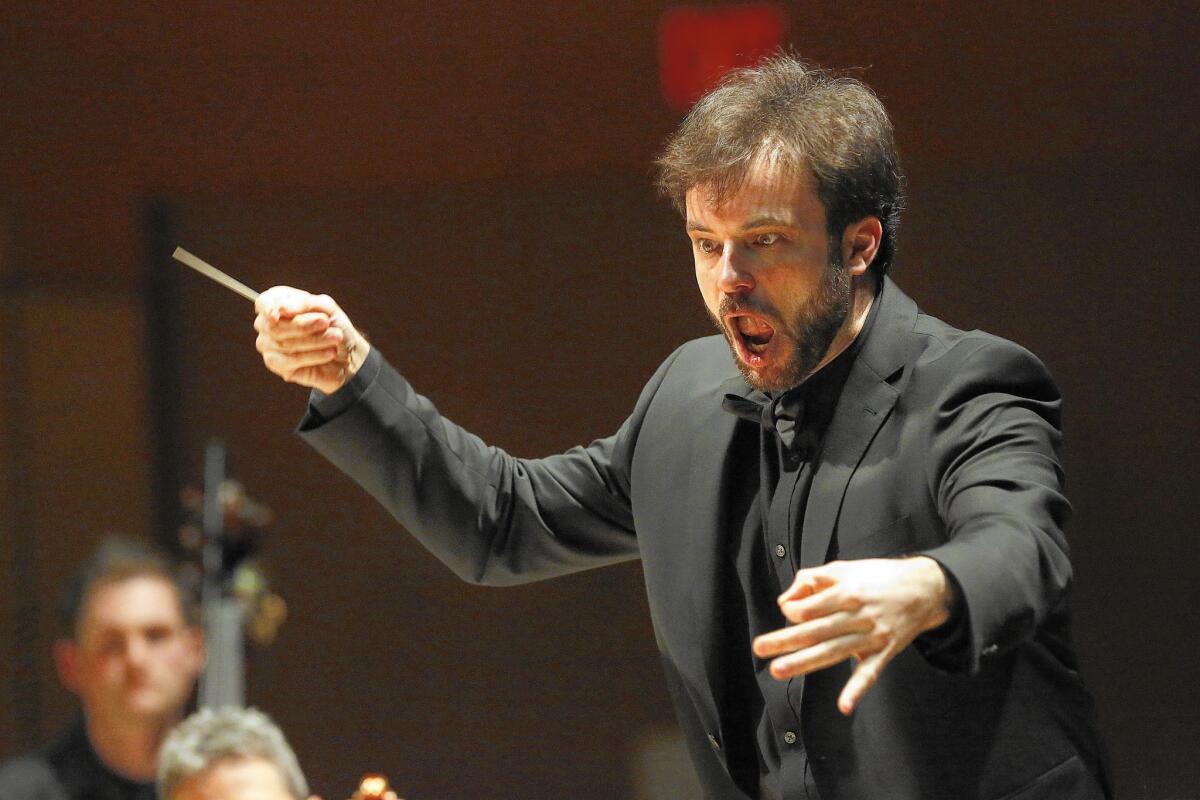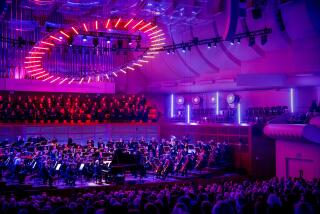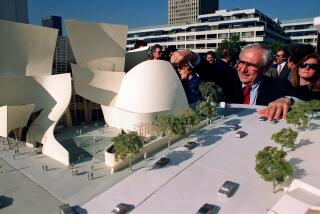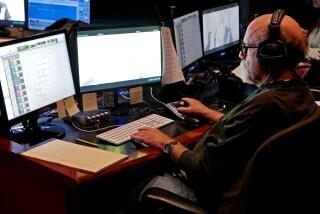Review: A Polish accent to L.A. Phil New Music Group’s Green Umbrella program

Listeners may recall the unsettling string effects of Krzysztof Penderecki’s 1961 “Polymorphia,” featured in “The Exorcist” and “The Shining.”
Nothing quite so hauntingly avant-garde turned up Tuesday at Walt Disney Concert Hall during the Green Umbrella series program, with 38-year-old Lukasz Borowicz conducting the Los Angeles Philharmonic New Music Group. But the concert, an eclectic mix of modernist, postmodern and neo-romantic contemporary Polish music, did feel like a throwback to the 1970s.
The night began with a U.S. premiere, Krzysztof Meyer’s aptly titled “Musique scintillante,” a sparkling, finely crafted 12-minute score that proved more substantive than its short time frame might suggest. The Krakow-born Meyer, 72, studied with Penderecki, but similarities between their compositional styles were mostly limited to Penderecki’s more tonal later period.
“Musique scintillante” proceeded by fits and starts, with short declarations from brasses and woodwinds driving the piece. Meyer’s expert writing for the 15 Philharmonic players, artful use of percussion and extended techniques, including pianist Vicki Ray plucking strings inside the piano, contrasted effectively with the score’s moments of repose and mystery. After fluttering figurations from the woodwinds, a final flourish from Nathan Cole’s violin ended the piece on a giddy note.
Throughout, conductor Borowicz maintained a lively pace, precisely executed by the Philharmonic musicians. Similarly, his account of Pawel Mykietyn’s mischievous “3 for 13” emerged as a colorful musical puzzle. In three movements for 13 players, the work is a witty short history of Western music — a pastiche of deconstructed Baroque and other musical styles. There’s even a passage for celesta reminiscent of Tchaikovsky’s “Nutcracker.”
Through some mysterious alchemy, Mykietyn’s orchestral effects and resourceful deployment of sonorities added up to more than the sum of its parts. The composer, 44, took a modest bow.
The program’s somber centerpiece, Penderecki’s Sinfonietta No. 2 for clarinet and 19 strings, a transcription of his 1993 Clarinet Quartet, featured Burt Hara. The Philharmonic’s associate principal, Hara gave a warm account of the solo part, his opening mournful tone echoed by dusky-sounding violas. Though Borowicz carefully balanced soloist and ensemble, much of Penderecki’s 18-minute score submerged the clarinet into the musical texture. Disconsolate harmonies reminiscent of Bartók’s “Concerto for Orchestra” offered fitful interest, but the work lost its way amid superficial brooding.
Composer-singer Agata Zubel’s nine-minute “Chapter 13” for soprano and instrumental ensemble, which was given its world premiere in the concert’s second half, might have benefited from less extravagant treatment. In her setting of the 13th chapter of Antoine de Saint-Exupéry’s “The Little Prince,” Zubel, 37, sang the parts of the prince and crude businessman. She used her super high-tessitura soprano to sometimes striking effect, but more often her articulation got swallowed up in Disney’s lively acoustic, shortchanging the text’s whimsical charm.
The longest work, Pawel Szymanski’s 20-minute “quasi una sinfonietta” (1990), in its West Coast premiere, offered many ideas in search of persuasive organization. For Szymanski, 61, that may have been the point of the eclectically restless score. Though spiked with lovely harmonies, the overstuffed and diffuse piece became wearying midway through.
MORE:
The Los Angeles Philharmonic through the years
‘Circular 14: The Apotheosis of Aristides’ honors the Portuguese Oskar Schindler
More to Read
The biggest entertainment stories
Get our big stories about Hollywood, film, television, music, arts, culture and more right in your inbox as soon as they publish.
You may occasionally receive promotional content from the Los Angeles Times.






